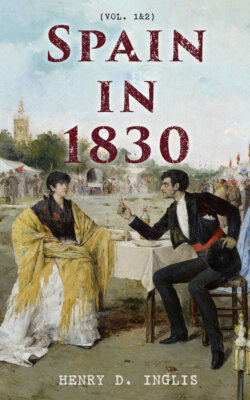Spain in 1830 (Vol. 1&2)

Реклама. ООО «ЛитРес», ИНН: 7719571260.
Оглавление
Henry D. Inglis. Spain in 1830 (Vol. 1&2)
Spain in 1830 (Vol. 1&2)
Table of Contents
VOLUME 1
CHAPTER I. BISCAY
CHAPTER II. JOURNEY FROM BISCAY TO MADRID
CHAPTER III. MADRID
CHAPTER IV. MADRID
CHAPTER V. MADRID
CHAPTER VI. MEMOIR OF MURILLO
CHAPTER VII. MADRID
CHAPTER VIII
CHAPTER IX. STATE OF PARTIES, AND POLITICAL PROSPECTS
CHAPTER X. THE ESCURIAL—ST. ILDEFONSO—SEGOVIA
CHAPTER XI. TOLEDO
VOLUME 2
CHAPTER XII. JOURNEY FROM MADRID THROUGH LA MANCHA, ACROSS THE SIERRA MORENA, AND BY CORDOVA TO SEVILLE
CHAPTER XIII. SEVILLE
CHAPTER XIV. XERES, AND ITS WINES
CHAPTER XV. CADIZ, AND JOURNEY OVERLAND TO GIBRALTAR
CHAPTER XVI. GIBRALTAR. MALAGA
CHAPTER XVII. JOURNEY FROM MALAGA TO GRANADA.—GRANADA
CHAPTER XVIII. JOURNEY FROM GRANADA TO MURCIA.—MURCIA
CHAPTER XIX. JOURNEY FROM MURCIA TO ALICANT—ALICANT; AND JOURNEY FROM ALICANT TO SAN FELIPE AND VALENCIA
CHAPTER XX. VALENCIA.—JOURNEY TO BARCELLONA
CHAPTER XXI. BARCELLONA—JOURNEY TO THE FRONTIER
FOOTNOTES:
Отрывок из книги
Henry D. Inglis
Travel Narrative of an Adventurous Journey
.....
But along with Biscayan bluntness, there is much good heartedness and honesty, and a great deal of intelligence; and even the pride of a Biscayan, has given rise to much of the industry and enterprise which in the province of Biscay are so conspicuous in the cultivation of the soil, in the construction of useful works, and in the establishment of praiseworthy institutions. Many of the inhabitants of Biscay in the upper classes have made voyages into other countries, and have returned with diminished prejudices, and increased liberality of sentiment; and the consequence of this has been, that among the educated, and better classes of society, there is little narrowness in political sentiment, and little bigotry in religion. I heard several of the most respectable inhabitants of Bilbao express openly much dissatisfaction at the political debasement of Spain, and breathe ardent wishes for the diffusion of intellectual and religious light; but they added, what my own knowledge has since fully confirmed, that I should not find in any other part of Spain, the same enlightened views as I had found in Biscay. Among the lower orders in Bilbao, and in Biscay generally, there is still much bigotry both in politics and religion, but more especially in the latter; during the existence of the constitution, the prejudices of the lower ranks made it necessary to affix in large letters over the doors of all the churches, and attested by the existing authorities, these important words—“The Roman Catholic is the only true religion.”
In Biscay there are not many poor, nor many rich. Formerly, Bilbao contained many wealthy citizens; but the export trade in wool was then flourishing. At that time the clearances were more than double their present number; but ever since the preference of Saxon wool has begun to be shewn in the foreign markets, the trade of Bilbao has declined, and now, not more than between thirty and forty British vessels visit Bilbao in the course of a year. Some few houses in Bilbao have still considerable returns from the fish trade, and one or two, from the iron export trade; but this has also fallen off, since the demand for Swedish iron has increased. Biscayan iron would still command a preference in the foreign markets, from its superior qualities for finer purposes, if it could enter them at the same price as Swedish iron; but this is impossible, both on account of the expense of fuel for furnaces, and the want of inland navigation. Timber is not scarce in the province of Biscay; but there is an old Biscayan law which tends to keep up its price, enacting that for every tree cut down, six must be planted in its stead; this is often felt to be an inconvenience, and produces scarcity in the midst of plenty. I was informed that two or three houses in Bilbao realize from 2 to 3000l. a-year; but I believe I may assert that no one spends 300l. It is difficult to spend money in Bilbao: in no part of Spain, least of all in Biscay, is it the custom to live extravagantly or luxuriously. The table of a Biscayan is remarkable for its simplicity and sameness: of whatever rank he may be, he takes his cup of chocolate and bread, followed by a glass of sugar and water, about eight o’clock; he dines about one, and six days out of seven, his dinner consists of broth, and a puchero, which is boiled beef, with a small bit of pork, surrounded either by cabbage, or Spanish peas, (garbanzos), and varied occasionally with a sausage; a cup of chocolate again in the afternoon, and for supper, boiled lettuce prepared with vinegar, oil and pepper, finish the repasts of the day. The menage at home, therefore, costs but a trifling sum; and neither does the Biscayan spend any thing upon entertaining his friends; not that he is unsocial; he is social according to the custom of his country. During the winter, a circle of six, eight, or ten families form themselves into a society, and agree to visit each other; each chooses a week, and during each week the circle assembles every evening at the same house; they take chocolate before going out, and sup when they return; the entertainment is entirely intellectual; music, cards, and dancing fill up the evening. Upon one occasion only, does the circle eat together: all the money lost and won at cards, is made a purse, and is confided to one of the party; and during the summer it is converted into a dinner in the country, of which all the members of the circle partake.
.....